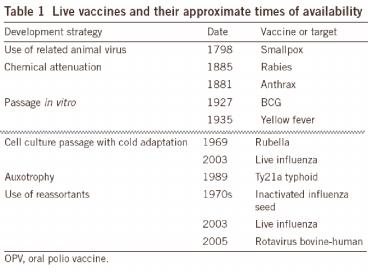Vaccine Technology - PowerPoint PPT Presentation
1 / 19
Title:
Vaccine Technology
Description:
... applied broadly throughout the world, several circumstances must be maintained: higher price in developed countries, ... ac.za/tutorial/209C/plotkin ... – PowerPoint PPT presentation
Number of Views:510
Avg rating:3.0/5.0
Title: Vaccine Technology
1
Vaccine Technology
2
Vaccine Technology
3
Vaccine Technology
4
Vaccine Technology
Strategy Examples of pathogens
targeted Recombinant protein production
Hepatitis B S Ag, pertussis toxin, Lyme outer
surface protein A, CMV gB protein Live
related recombinants Dengue genes in yellow fever
17D, parainfluenza 12 genes in
parainfluenza 3, M. tuberculosis genes in
BCG Alpha virus replicons HIV, Hemorrhagic
Fevers Replication-defective particles HPV,
SARS Naked DNA plasmids HIV and many
others Prime boost using DNA/vectors HIV,
malaria, tuberculosis Reverse vaccinology
Meningococcus B Microarrays for virulence genes
Mainly bacteria Synthetic peptides Cancer, CTL
vaccines Synthetic polysaccharides Hib Reverse
genetics Influenza, parainfluenza, RSV
5
Vaccine Technology
- Newer Technology
- Mammalian cell culture live and killed vaccines
- Subunit vaccines
- From serum (HBV) or virus / bacterial disruption
- Made via recombinant DNA technology
- Recombinant vaccine vectors
- DNA vaccines
6
Vaccine Technology
- Old Technology
- Grow in animals (vaccinia in calves for smallpox
rabbit brains for rabies) - Simple bacterial culture (Cholera vibrio) then
inactivation - Grow in eggs (influenza, vaccinia) then inactivate
7
Vaccine Technology
8
Vaccine Technology
9
Vaccine Technology
10
Vaccine Technology
11
Vaccine Technology
12
Vaccine Delivery
13
Vaccine Technology
14
(No Transcript)
15
(No Transcript)
16
New problems
- Prospects for control of diseases by vaccination
are quite bright BUT - Vaccine supply is insufficient.
- Too few manufacturers
- Regulatory pressures render production more
difficult. - New manufacturers in developing countries like
India, China, Indonesia and Brazil may fill this
gap. - Cost of vaccines is also now a problem
- New vaccines require 300 to 800 million to
develop - Companies that do RD must recoup costs.
- If vaccines are to be applied broadly throughout
the world, several circumstances must be
maintained - higher price in developed countries,
- recognition by governments that savings justify
expenditures - support by donor agencies of vaccine purchases
17
- There is a growing demand for vaccine safety.
- As disease recedes, the need for vaccination is
less obvious - More people depend on herd immunity
- Herd immunity will fail if too many refuse to be
vaccinated - There are real safety problems associated with
vaccines, like paralysis after oral polio vaccine
and disseminated infections after BCG - Older vaccines need to be re-examined to see
whether safety can be improved - EG replacement of whole-cell pertussis vaccine
by acellular pertussis - replacement of rabies vaccine made in brain by
vaccine made in cell culture. - vaccinia will be replaced by further attenuated
vaccinia and - Bacille Calmette-Guérin by engineered TB vaccines.
18
Risk-benefit ratios
Resistance to risk exposure through vaccine
Risk of disease
Time
19
- Zero risk is impossible to attain, and there will
always be tension between - the needs of public health and
- the regulatory impulse to guard against even
remote and theoretical risks. - As vaccines are key tools for maintenance of
public health, governments have a major role in
their dissemination through recommendations and
purchase. - It is doubtless more efficient for industry to
take vaccines from concept to licence, but
governments should advise about the choice of
targets for vaccine development and guarantee
markets for products developed at their request. - http//www.mcb.uct.ac.za/tutorial/209C/plotkin20v
accines.pdf































